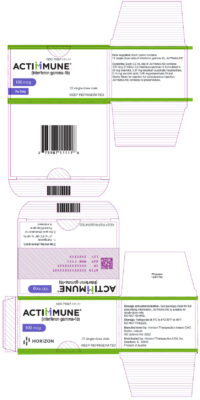Actimmune
Generic name: interferon gamma-1b
Brand name: Actimmune
Drug class: Interferons
What is Actimmune?
 Actimmune is a human protein. Interferons aid the body in fighting viral infections.
Actimmune is a human protein. Interferons aid the body in fighting viral infections.
Actimmune can be used to stop serious infections for people suffering from chronic granulomatous diseases. It is also used to stop the progress of bone disease known as malignant osteopetrosis.¶
Actimmune could also be used for other purposes that are not covered in this medication guide.
Warning and Precautions
Actimmune could cause the loss of blood cells, which help your body fight off infections. They also assist in the clotting of blood. It is possible to contract an infection or be bleeding more quickly. Contact your doctor if notice unusual bleeding or bruising or signs of an infection (fever chills, fever, and body discomforts).
- Cardiovascular Disorders: Cardiovascular diseases that already exist may be aggravated.
- Neurologic Disorders: If you have diminished mental status, gait disturbance, or dizziness, reduce or stop taking the medication.
- Thrombocytopenia and neutropenia should be observed in patients using ACTIMMUNE in conjunction with other potentially myelosuppressive medications, particularly when the drug is administered intravenously.
- Toxicity to the Liver: If substantial increases of aspartate transaminase (AST) and/or alanine transaminase (ALT) are observed, reduce the dose or cease the medication. Liver function should be monitored regularly in kids less than 1-year-old.
- Hypersensitivity Responses: If you experience severe hypersensitivity reactions, stop taking the medication and seek medical attention immediately.
- When delivering ACTIMMUNE to patients with severe renal insufficiency, it is important to monitor their renal function on a frequent basis.¶
Before taking this medication, you must consult your physician.
It is not recommended to take Actimmune in the event that you have an allergy to Actimmune or other drug products made of E. coli bacteria.
To be sure Actimmune is appropriate for you, you should inform your physician if you suffer from:
- kidney disease;
- Liver disease;
- heart rhythm issues;
- congestive heart failure;
- a nerve-muscle disorder;
- bone marrow suppression
- a history of transient Ischaemic attacks (TIAs) which include “mini-stroke”;
- A history that includes seizures or
- an allergic reaction to rubber.
It is unclear if this medication will affect a newborn baby. Inform your doctor if are expecting or planning to be pregnant.
This medication can affect fertility (your capacity to have children) regardless of whether you’re female or male.
It is unclear if interferon gamma-1b is absorbed into breast milk, or if it is harmful to the baby who is nursing. Do not breastfeed when taking this medication.
How to take Actimmune?
Follow the directions on the prescription label. Do not take this medication in greater or lesser amounts or for a longer time than the recommended time.
Actimmune injects under the skin. It is possible to be taught how to administer injections at home. Don’t give yourself the medicine if not know how to apply the injection correctly and properly dispose of any needles or Syringes.
Only use the Syringe included with this medication or as the one recommended by your doctor. Don’t mix Actimmune within the same syringe as other injectable drugs.
Don’t shake the medication bottle. Make your dose once you are ready to inject. Avoid using when the medication has changed color or has particles. Consult your pharmacist about the latest medication.
The single-dose bottle (bottle) that contains this medication is intended for use for only one time. Dispose of it after one usage, even if there’s still a little medication left after you have injected your dose.
Actimmune reduces blood cells which can aid in fighting off infections and allow your blood to form clots. This could make it easier for you to lose blood due to an injury or be sick when you are around people who are sick.
When you are taking Actimmune it is possible that you will require regular blood tests. Your kidney function might also require a check.
Consult your physician when you notice any changes in weight or height. Actimmune doses are determined by the body’s surface area (height as well as weight) and any change could affect the dosage.
Keep Actimmune inside the refrigerator. Do not freeze.
It is possible to take the medication from the refrigerator and let it get to room temperature prior to injecting the dose.
Do not keep the medicine a room temperature for longer than twelve days. Throw the medicine when it has been at room temperature for longer than twelve hours. Do not place it back into your refrigerator.
Make use of the disposable needle and syringe just once. Make sure you follow any local or state laws regarding disposing of used needles and Syringes. Make sure you use puncture proof “sharps” disposal container (ask your pharmacist for one and how to dispose of them away). Make sure that the container is away from animals and children.
Dosage and administration
- Subcutaneous use only.
- The recommended dosage is 50 mg/m2 for those whose surface exceeds 0.5 meters and 1.5 mg/kg/dose for those with a body surface smaller than 0.5 3 m2 every three weeks.
- Examine blood chemistry, hematology, and urinalysis prior to the treatment’s beginning and every 3 months.
- If there are severe reactions If severe reactions occur, decrease the dose to 50 percent or cease treatment until the reaction is gone.
If I don’t take a dose?
Take the missed dose when you can remember. Avoid your missed dosage if you are close to the time of the next dose. Don’t use any extra medication to make up for the missed dose.
If I take too much?
For medical emergencies, seek emergency medical attention or contact toll-free the Poison Help line at 1-800-222-1222.
In the case of overdose, symptoms could be accompanied by changes in your mental health, dizziness, inability to stability or coordination issues, or flu-like symptoms.
What should I be aware of when taking Actimmune?
Alcohol consumption with Actimmune may cause adverse side consequences.
The medicine could affect your reactions or thinking. Be cautious when driving or doing any activity that requires you to be alert.
Actimmune side effects
Contact a medical professional immediately Get medical attention immediately if you notice symptoms warning signs of an allergic response such as an allergic reaction that causes hives and breathing problems and swelling of your lips, face, and throat.
Contact your doctor immediately If you suffer from:
- confusion, hallucinations;
- a seizure (convulsions);
- low blood cell counts–fever, chills, flu-like symptoms, swollen gums, mouth sores, skin sores, easy bruising, unusual bleeding; or
- kidney issues: little or no urinary tract infections, painful or difficult to urinate, swelling on your ankles or feet, and feeling exhausted or feeling sluggish.
Your dosages could be delayed or decreased in the event of specific side effects.
Common side effects can be:
- fever chills;
- diarrhea;
- headache;
- fatigue;
- The rash, or
- itchy or tenderness at the site in the area where the medicine was injected.
This isn’t a complete list of all side effects. other side effects could be experienced. Consult your physician for advice regarding medical adverse effects. You can report any side effects to the FDA at 1-800-FDA-1088.
What other medications can have an effect on the Actimmune?
Other medications may interfere with interferon gamma-1b which includes prescription and over-the-counter medications, vitamins, and herbal products. Be sure to inform your health professionals about any medications you take in the present and any medication you stop or start using.
Dosage Form and label
- Injection: 100 mcg (2 million International Units) of Interferon gamma-1b
- 0.5 mL solution in a single-dose vial.

More details
Keep this and other medicines away from the reach of children. Never let your medications be shared with anyone else Use this medicine only in the manner prescribed by your doctor.
Always consult your doctor to make sure the information presented on this page is applicable to your specific situation.
